North Korea is planning something big for the 2018 Olympics
No, it's not an electrifying ice dance
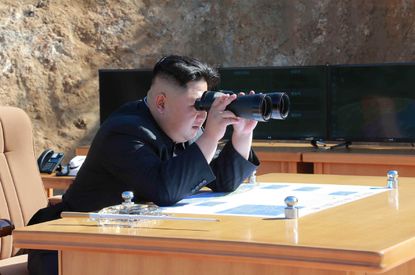

It has been 60-plus days since North Korea fired off its last missile into the skies above northeast Asia, causing a global freakout.
And while I love being able to do things like sleep, spend time with my wife and crazy dogs, and have something resembling a normal life that isn't interrupted by the latest Pyongyang paranoia, the biggest questions I get these days are this: What is North Korea waiting for? When is the next big missile test going to be?
Such questions always lead to other questions. Could Pyongyang be afraid of rousing the wrath of President Trump — losing the oh-so-precious opportunity to be his "friend"? Or maybe Kim Jong Un is hoping to get some credit for good behavior, trying to cool tensions with Washington and Seoul and move to the negotiating table? Perhaps now that it's sending diplomats to the so-called hermit kingdom to head off a showdown, China is playing a calming role?
Subscribe to The Week
Escape your echo chamber. Get the facts behind the news, plus analysis from multiple perspectives.

Sign up for The Week's Free Newsletters
From our morning news briefing to a weekly Good News Newsletter, get the best of The Week delivered directly to your inbox.
From our morning news briefing to a weekly Good News Newsletter, get the best of The Week delivered directly to your inbox.
No way. This is all just the calm before the storm.
Kim has big goals for 2018 — and he may have a diabolical plan to showcase his growing nuclear and missile might. In fact, if I was a betting man, I would tell all Asia experts in Washington and around the world to have their calendar clear on Feb. 9, 2018 — the start of the Winter Olympics. Why, you ask? The games this year are just 50 miles away from the North Korea border, in Pyeongchang, South Korea.
There might never be a better time for Pyongyang to fire off its latest ICBM, test a super-duper hydrogen bomb, strike with a massive cyber-attack, or try some combination of the three — if Kim is looking for maximum media coverage, that is.
The Olympics are the biggest reason that I bet North Korea will likely hold off on any large demonstrations of national firepower until early 2018. But there are also well-established, seasonal trends that only reinforce the idea that the rogue state will delay any big provocations until next year.
For starters, North Korea, according to published data, attempts very few missiles tests in the fourth quarter of the year. The most accepted rationale for this is that many North Korean soldiers are back on the farm, caring for crops. Pyongyang also drills the army during regular cycles throughout the fall and into early winter. So Kim Jong Un's armed forces, it would seem, are just occupied doing other things from roughly the end of September until January. When you factor in the Olympics, all signs point to planet Earth being largely trouble-free, at least when it comes to North Korea, for a few months.
But make no mistake, trouble is coming.
So what will North Korea exactly do on or around the Olympic Games? Kim has quite a few options, including, but not limited, to the below. (I save the scariest options for last.)
Showcase its cyber capabilities — on the Olympics itself: Pyongyang can do far more than take down Sony Pictures and post some C-list movies on the internet. Oh no, North Korea could do major damage to many big corporations' or countries' computer networks if it chose to. In fact, if Kim really wanted to make a statement, why not target the computer networks that control the TV feeds of the Olympics themselves or even the power grids that work 24/7 to make such a spectacle happen?
If Kim wanted, he could even use North Korean agents working in other countries via proxy servers to mask the origin of the attack — so we would suspect Pyongyang but there would always be doubt. The fog of cyberwar, perhaps?
Test an ICBM or an advanced missile — by firing it right over the games: Imagine this scene. Thousands of people — with hundreds of millions watching around the globe — are cheering the athletes marching into Olympic Stadium. Then, just overhead, North Korea's latest three-stage ICBM blazes through the atmosphere, showing the world that no nation is truly safe from Kim Jong Un's mighty missiles. If Pyongyang was looking for a way to feed a media narrative that it's truly a nuclear power to be reckoned with, there could be no better symbolism.
Test a nuclear weapon: Kim could even get more extreme and test an underground nuclear weapon during the opening ceremonies or other parts of the Games. He would dominate the news cycle, showcase his growing capabilities, and do what he loves so much: make the world fear his growing nuclear arsenal.
Test a nuclear weapon — in the atmosphere: Kim might even be bold enough to fire a nuclear-tipped missile into the South Pacific and detonate it. The goal, besides creating an international emergency on par with the Cuban Missile Crisis, would be to prove to the world that North Korea is a full-fledged nuclear power and that we are truly out of time to stop it. In fact, North Korea might just copy this from big-brother China's own nuclear playbook.
To be clear, this would carry obvious risks, including a potential retaliatory strike by the Trump administration. However, Kim might feel it's worth it as he would end any talk that North Korea was months or years away from being able to hit America.
Attack the Olympics directly: If Kim really is crazy — which I don't think he is — he could just decide to launch a strike on the Olympics directly. He has the missiles, rockets, and artillery to strike the Games and drive up a serious body count. Of course, Kim would know the whole world would instantly unite against him and regime change would be almost inevitable. While I think the chances of this are near impossible, it is an option — especially if Kim thought Washington was zeroing in on a plan to launch some sort of decapitation or pre-emptive strike or he just got wind of intelligence that regime change was coming.
I guess, for now, I will enjoy my eggnog, mistletoe, and Charlie Brown Christmas reruns. Because it looks like 2018 is going to start with a bang.
Sign up for Today's Best Articles in your inbox
A free daily email with the biggest news stories of the day – and the best features from TheWeek.com
Harry J. Kazianis is director of defense studies at the Center for the National Interest, founded by former U.S. President Richard M. Nixon.
-
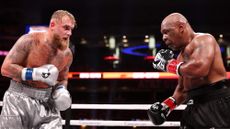 'All Tyson-Paul promised was spectacle and, in the end, that's all we got'
'All Tyson-Paul promised was spectacle and, in the end, that's all we got'Instant Opinion Opinion, comment and editorials of the day
By Justin Klawans, The Week US Published
-
 Changes are coming for 401(k)s and IRAs in 2025. Here's what to know.
Changes are coming for 401(k)s and IRAs in 2025. Here's what to know.The Explainer News about part-time workers, auto-enrollment and penalties for inherited IRAs
By Becca Stanek, The Week US Published
-
 Biden visits Amazon, says climate legacy irreversible
Biden visits Amazon, says climate legacy irreversibleSpeed Read Nobody can reverse America's 'clean energy revolution,' said the president, despite the incoming Trump administration's promises to dismantle climate policies
By Peter Weber, The Week US Published
-
 Has the Taliban banned women from speaking?
Has the Taliban banned women from speaking?Today's Big Question 'Rambling' message about 'bizarre' restriction joins series of recent decrees that amount to silencing of Afghanistan's women
By Harriet Marsden, The Week UK Published
-
 Cuba's energy crisis
Cuba's energy crisisThe Explainer Already beset by a host of issues, the island nation is struggling with nationwide blackouts
By Rebekah Evans, The Week UK Published
-
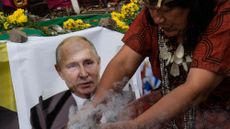 Putin's fixation with shamans
Putin's fixation with shamansUnder the Radar Secretive Russian leader, said to be fascinated with occult and pagan rituals, allegedly asked for blessing over nuclear weapons
By Harriet Marsden, The Week UK Published
-
 Chimpanzees are dying of human diseases
Chimpanzees are dying of human diseasesUnder the radar Great apes are vulnerable to human pathogens thanks to genetic similarity, increased contact and no immunity
By Harriet Marsden, The Week UK Published
-
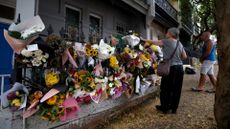 Deaths of Jesse Baird and Luke Davies hang over Sydney's Mardi Gras
Deaths of Jesse Baird and Luke Davies hang over Sydney's Mardi GrasThe Explainer Police officer, the former partner of TV presenter victim, charged with two counts of murder after turning himself in
By Austin Chen, The Week UK Published
-
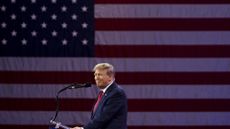 Quiz of The Week: 24 February - 1 March
Quiz of The Week: 24 February - 1 MarchPuzzles and Quizzes Have you been paying attention to The Week's news?
By Sorcha Bradley, The Week UK Published
-
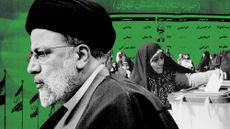 Will mounting discontent affect Iran election?
Will mounting discontent affect Iran election?Today's Big Question Low turnout is expected in poll seen as crucial test for Tehran's leadership
By Sorcha Bradley, The Week UK Published
-
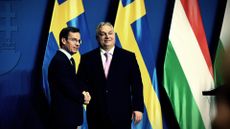 Sweden clears final NATO hurdle with Hungary vote
Sweden clears final NATO hurdle with Hungary voteSpeed Read Hungary's parliament overwhelmingly approved Sweden's accession to NATO
By Peter Weber, The Week US Published